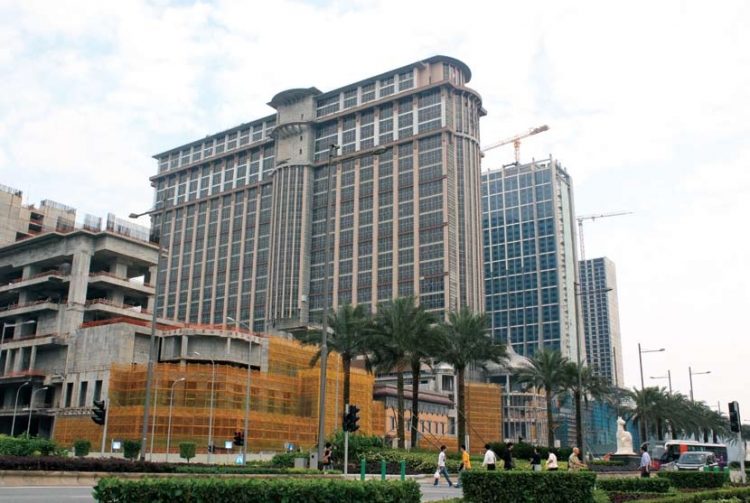There are signs of improving relations between LVS and Macau officials—but no clarity yet on Cotai 5 and 6’s opening
Suggestions in late October that Sands China had finally managed to do a deal with the Macau government to get much needed workers onto its Cotai 5 & 6 extension seemed to mark a turning point in the bilateral relationship.
There was talk of imminent government approval for 5,000 non-Macau workers to be brought on site by the contractors hired by Sands China. Given officials had previously announced a policy allowing outside hiring only on a one-to-one basis (i.e. one local for every migrant employed), it looked as much a political gesture of goodwill by the government towards Las Vegas Sands Corp (LVS) and Sands China as the tidying up of a bureaucratic issue. Michael Leven, Acting Chief Executive of Sands China, said back in July the company had about 1,300 construction workers on site—half of what it needed at that stage.
The timing, therefore, of former Sands China CEO Steve Jacobs’ lawsuit against the company alleging breach of contract is particularly unfortunate. It claims (allegations strongly denied by Sands China and LVS) that Mr Jacobs was asked to act “illegally” by organising secret investigations into the business and financial affairs of high-ranking members of the Macau government. The deposition filed on 20th October in a Las Vegas, Nevada, court, says the aim was that any negative information obtained could be used to exert ‘leverage’ in order to thwart government regulations and/or initiatives viewed as adverse to LVS’s interests.
“While Las Vegas Sands normally does not comment on legal matters, we categorically deny these baseless and inflammatory allegations. From here on out, we will let the process work its way through the appropriate legal system,” Sands China said in a prepared statement.
Shared interests
Although the episode can hardly be seen as helpful in the effort to cultivate the relationship between the Macau government and Sands China, it doesn’t automatically follow that the allegations will make things worse. It’s in the interests of both parties to be on good terms, even if, strategically speaking, both sides have different short-term goals. The concern of the government is to prevent the Macau market growing too big too quickly. The market is already on course for a 60% increase in gaming revenue in 2010 compared to 2009. October revenue totalled MOP18.87 billion (US$2.36 billion), up 50% from MOP12.60 billion a year earlier and September’s MOP15.30 billion, according to data from Macau’s Gaming Inspection and Coordination Bureau.
Given that Macau’s revenues are driven principally by VIP baccarat, it doesn’t naturally follow that a gaming revenue surge means a surge in the number of visitors. In September, for example, arrivals were only up 9% year on year, while gross gaming revenues were up 60.1% year on year. Even more significantly, the mainland Chinese ‘component’ of Macau’s September visitors rose only 2% year on year. Nonetheless, the Macau government has its eyes not only on Beijing but also on the needs of its own citizens. Crowding on the streets, on public transport and at the ferry terminals and land entry points attributed to the presence of a lot of day-trippers has caused public disquiet among Macau residents in the past. Public discontent in turn attracts the attention of Beijing.
The last thing Macau’s chief executive, Chui Sai On, needs is Beijing having to divert its attention from the many structural challenges faced by the modernizing Chinese economy to spend time undoing Macau’s ‘success’. The previous time that happened under Edmund Ho’s leadership in 2008, it led to visa restrictions and renewed calls for Macau to diversify its economy.
Conflicting pressures
The concern of Sands China and its parent LVS is to get as much of its remaining Macau infrastructure built and operational as quickly as possible, so that it can generate revenue to help pay off its huge global debt. Having Mr Leven, President and Chief Operating Officer of LVS, currently based in Macau may be helpful in reconciling those two positions. Although Mr Leven is ostensibly there to cover as CEO of Sands China until the company replaces Mr Jacobs, it’s probably no accident that his tenure has coincided with an apparent thawing of relations with the Macau government. As senior as Mr Jacobs was, he will have been seen by Macau officials as one of the local ‘Indians’ rather than one of the Las Vegas ‘Chiefs’.
It’s not, however, Mr Leven’s job to hold out a peace pipe every time a government official comes calling. His job is to steer a path that robustly supports the interests of his employer and investors while finding some kind of accommodation with Macau. Some hint of the opposing pressures that this creates can be seen over the issue of the proposed completion date for Cotai 5 & 6.
For a company strongly focused on prompt delivery of projects with a clear timeline for investors, it must be intensely frustrating (and costly) for LVS that it has to put its commercial needs second to the domestic political agenda of Macau and China. That might account for the reluctance of Sheldon Adelson, the company’s Chairman and Chief Executive, to accept publicly too much slippage in the timetable for Cotai 5 and 6. In the second quarter earnings conference call for LVS in late July, Mr Adelson was insisting a fourth quarter 2011 completion was possible for phase one, even while some analysts were already saying a first quarter 2012 date seemed more likely. In the third quarter earnings conference call, in late October, the most Mr Leven would commit to was that he would have some clarity on the opening date “in the next 30 days”. He then amended that during the same conference call to “by the end of this year”. That suggests logistical issues over Cotai 5 & 6 haven’t yet been entirely resolved.

































